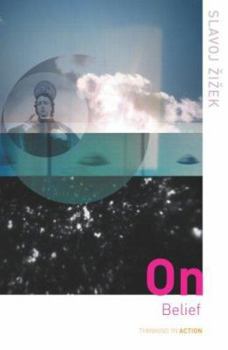On Belief
Select Format
Select Condition 
Book Overview
What is the basis of belief in an era when globalization, multiculturalism and big business are the new religion? Slavoj Zizek, renowned philosopher and irrepressible cultural critic takes on all comers in this compelling and breathless new book.
From 'cyberspace reason' to the paradox that is 'Western Buddhism', On Belief gets behind the contours of the way we normally think about belief, in particular Judaism and Christianity. Holding up the...
Format:Paperback
Language:English
ISBN:0415255325
ISBN13:9780415255325
Release Date:May 2001
Publisher:Routledge
Length:192 Pages
Weight:0.48 lbs.
Dimensions:0.6" x 5.1" x 7.8"
Customer Reviews
4 ratings
oh zizek...
Published by Thriftbooks.com User , 14 years ago
This is one of the my favorites by Zizek (the other being The Fragile Absolute). Zizek is a master at diagnosing the contemporary game for what it is: synthetic, gnostic, and without meaning (Nietzsche wins?!). Yet, he does so in a way that provides, perhaps theoretically, some sort of intellectual resources for how to go beyond our dual fascination with all things material and, paradoxically, immaterial. Plus, he is just a fun read. He is one of few writers that I genuinely can return to time and time again (even if it is to discover exactly where I disagree with him).
bizarre: one of the best as well as the worst
Published by Thriftbooks.com User , 21 years ago
Zizek argues in this book along with Kierkegaard (Fear and Trembling) that there should be a "teleological suspension of the ethical category" in favor of the religious. In Kierkegaard's book he says that Abraham is asked by God to suspend the ethical in order to kill his son Isaac. Of course God stops the killing before it takes place, but first he wants to test whether Abraham is willing to suspend the ethical in order to give primacy of place to the religious. Zizek uses this paradigm to argue that Leninists had the right to suspend the ethical in order to put their religious fervor to the test by slaughtering liberal Mensheviks, and millions of others, after the October revolution. This is a strange book played out with fantastic verve and bizarre humor. One isn't sure how seriously Zizek takes his "belief" in Leninism. This is one of the worst books on an ethical basis I've ever read, but aesthetically it's one of the best efforts in contemporary theory -- fun to read, whacky "beyond belief," and filled with a real fun for sentence making. The sentencing of the Marxists, both their own in terms of Solzhenitsyn and others, as well as the sentence that the liberal west has laid on them in order to lay them down to rest, is replayed as if it was a trauma that needs to be relived. The result is a species of madness: a great book with a seemingly bizarre ethical message: kill all liberals to prove your religious fervor for a secular religion that is widely discredited for asking for such mass murder. God never asks Abraham to go through on his killing of his son. Zizek appears to condone the killing of millions by communists in the twentieth century through using Kierkegaard's paradigm for understanding Abraham and Isaac. Zizek has a lot of fun with this comparison. I suffered, and I think most Christians would suffer because the comparison seems so grotesque and so completely out of control, but Marxists will delight in this religious rationale for their peculiarly bloody heritage.
a small treasure
Published by Thriftbooks.com User , 21 years ago
I have recently began reading Zizek after picking up this short essay that he wrote for Routledge's Thinking in Action Series. His idiosyncratic writing style has its quirks which I could imagine some people despising, but I enjoyed it myself. He has an incredible talent for looking abstruse concepts and philosophical debates in a fresh perspective that definitely could be described as 'thinking outside of the box'. He writes with a ad hoc mixture of pop culture, hitchcock, philosophy, theology, doxology, and Lacanian psychology. And his message is a powerful one--reaffirming the human and the real against what he terms 'the digital heresy'. By the end of his essay, he has you wanting to believe once again--or maybe just to admit to yourself that you've believed all along.
Never for any *Feint* of the Heart
Published by Thriftbooks.com User , 21 years ago
I disagree with the reader from Montreal: Belief itself may fail on all accounts, but nevertheless persists and insists. If anything this book enacts -- in Zizek's Helegian fashion -- the very concept under discussion. For that reason Zizek's dialectic is joyous, tumultuous and, yes, RAMBLING. But the subtle reader will notice that the transition from one random topic to the next is always tied together later, when ex nihilo a Master-Signifier emerges to order the text in a consistant fashion.Furthermore I reccomend any of Zizek's rambling, ill defined arguements or pedantry. Buyer beware, but not of this book!





